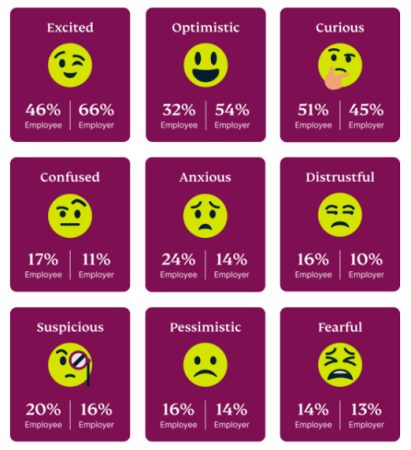Employees want metaverse support
With big-name employers already setting up in the metaverse, employees aren’t so bought in…
Why You Should Care
With many businesses now digital-first the metaverse is a potential next evolution.
However, employers and employees don’t seem to be on the same page regarding its benefits.
Thankfully, there are ways forward when it comes to making the metaverse work for employers.
Work, done digitally, remotely, or in a hybrid manner has become the norm over the past two years.
And, with many employers looking to engage in an even more digital future of work, it is not surprising that ExpressVPN found in their recent survey employee and employer survey that 77% of employers are interested in immersive work environments like the metaverse.
However, with the metaverse no longer the stuff of fantasy — Adidas, Apple, and Nike have all set up shop here already — it is important to take on board what employees think of any potential moves.
Employees have their say
Firstly, ExpressVPN found that many employees aren’t as au fait with what the metaverse is compared to employers: while 69% of bosses understand what it’s all about, only 42% of workers get it.
As such, employers are more likely to be excited, curious, and optimistic about the metaverse with employees more suspicious.
This is despite 90% of employees saying that technological advancements have increased productivity as well as fostered better connectivity.

Copyright ExpressVPN
Company size also matters. Companies with more than 500 people, compared to companies of less than 500 people, were more likely to say that metaverse working would boost creativity, performance, and work-life balance, too.
Indeed, increased work-from-home flexibility was the benefit most cited regards hopes about what the metaverse would bring followed by better collaboration and increase job opportunities.
Yet, it wasn’t all positive. With 73% of employers already admitting to surveilling their employees, 63% of employees are concerned about their employer collecting their data in the metaverse with more than six in 10 fearing monitoring.
The survey found that many employers would plan to record meetings (42%), track location (39%), and time track (39%), too.
Different age demographics also have different opinions about the metaverse. Perhaps unsurprisingly, Generation Z, the youngest cohort of workers, is the most excited about metaverse working, believing it will improve their productivity.
It means that companies have a big job on their hand in getting all employees on board if they want to make a move to the metaverse.
In fact, only 36% of workers trust Meta to lead the workplace into the metaverse. Interestingly, 61% would trust Microsoft to do so. In addition, many employees are not up to scratch with metaverse-enabling technologies such as Magic leap (60% of employees don’t know what it is) and Nvidia (42% do not know).
Making the metaverse work
With so many differing views on the metaverse, Jayson Darby, head of science at Thomas International, previously explained that employers must assess the cost and needs of such a move, whether it is right for the business, and whether it might exacerbate the worst parts of digital work.
He said: “Working in the metaverse could also result in issues such as virtual presenteeism.”
“Business leaders can do this by recognizing symptoms in their workforce. Obviously, this is harder when interacting with an avatar, so firms should ensure they make time for metaverse ‘downtime’,” he continued.
However, if businesses can get the implementation, engagement, and belonging pieces key, there could be untold benefits.
As a PwC study found, employees are often willing to invest their own time in getting new digital capabilities, for new digital environments, if their employers support them.
A finding worth noting.
Sign up to the UNLEASH Newsletter
Get the Editor’s picks of the week delivered straight to your inbox!

Multiple award-winning journalist, editor and content strategist
Dan is an award-winning HR journalist and editor with over five years experience in the HR space.
